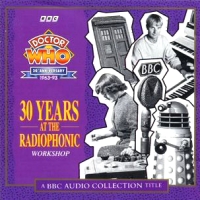| Track # | Artist | Track name | Stories used in |
|---|
| 1 | Delia Derbyshire | "Original Theme" | Various |
| 2 | Brian Hodgson | "TARDIS Exterior" |
| 3 | "TARDIS Take-off" |
| 4 | "Sensorites In Laboratory" | The Sensorites |
| 5 | "Slyther on the Move" | The Dalek Invasion of Earth |
| 6 | "Death Of A Mirebeast" | The Chase |
| 7 | "Mechanoid" |
| 8 | "Dalek Spaceship Takes Off" |
| 9 | "Dalek Spaceship Lands" |
| 10 | "Chumblie Constant Run" | Galaxy 4 |
| 11 | "Chumblie At Rest" |
| 12 | "Chumblie Dies" |
| 13 | "Few Fishpeople" | The Underwater Menace |
| 14 | Delia Derbyshire | "Signature Tune –A New Beginning" | Various |
| 15 | Brian Hodgson | "Propaganda Sleep Machine" | The Macra Terror |
| 16 | "Macra Control and Macra" |
| 17 | "Destruction of the Daleks" | The Evil of the Daleks |
| 18 | "Cobweb Mutates" | The Web of Fear |
| 19 | "Yeti Growls,Roars and Dies" |
| 20 | "Four Yetis Signalling" |
| 21 | "Cybermats Attracter to Ship" | The Wheel in Space |
| 22 | "Start of the Cyber Invasion" |
| 23 | "Birth of the Cybermats" |
| 24 | "Cybermat Killed by Special Sound" |
| 25 | "Quarks Chuckle" | The Dominators |
| 26 | "Quark Kills" |
| 27 | "Quark Goes Berserk and Explodes" |
| 28 | "Kroton Theme with Birth and Death of a Kroton" | The Krotons |
| 29 | "Original Sonic Screwdriver" | The War Games |
| 30 | "Time Zone" |
| 31 | "Sidrat Control" |
| 32 | "Factory with Mechanical and Physiological Autons and Auton guns" | Spearhead from Space |
| 33 | Delia Derbyshire &Brian Hodgson with Paddy Kingsland | "Signature Tune (The Delaware Version)" | Never used in the series |
| 34 | Brian Hodgson | "TARDIS Lands" | Various |
| 35 | Dick Mills | "Threat to Sarah" | The Sontaran Experiment |
| 36 | "Sonic Screwdriver (Multi-Purpose Mode)" | Various |
| 37 | "Wirrn in the Infrastructure" | The Ark in Space |
| 38 | "Void" | The Masque of Mandragora |
| 39 | "Shuttle Landing Sequence" | The Invisible Enemy |
| 40 | "Fendahl Shuffle and Slobber" | Image of the Fendahl |
| 41 | "Vardan Materialises and Shimmers" | The Invasion of Time |
| 42 | "K9 Probe and Gun" |
| 43 | "TARDIS Doors" |
| 44 | "White Guardian's Windbells" | The Ribos Operation |
| 45 | Elizabeth Parker | "An Ogri About" | The Stones of Blood |
| 46 | "Pouring Crystals" |
| 47 | Dick Mills | "Attack on War Room" | The Armageddon Factor |
| 48 | "Doctor's Repair to TARDIS' Central Column Fails" | The Horns of Nimon |
| 49 | "Foamasi Voices" | The Leisure Hive |
| 50 | "Doors" | Meglos |
| 51 | "Reactivation and Laboratory Rises" |
| 52 | "Dodecahedron Beams" |
| 53 | "Marshmen Emerge from the Mistfall" | Full Circle |
| 54 | "Timewinds" | Warriors' Gate |
| 55 | "TARDIS Landing Bleep" | Various |
| 56 | "Cloister Bell" | Castrovalva |
| 57 | "March of the Victims" | Terminus |
| 58 | "Search,Capture and Display Dolls" | "The Five Doctors" |
| 59 | "Scrolls Self-Destruct" |
| 60 | "Borusa Destroyed" |
| 61 | "Myrka Passes" | Warriors of the Deep |
| 62 | "Sea-Devils Energising Chamber inside Silurian Rock" |
| 63 | "Exploding River of Mud" | The Caves of Androzani |
| 64 | Elizabeth Parker | "Timelash Music Suite" | Timelash |
| 65 | Dick Mills | "Tissue Compression Eliminator" | The Trial of a Time Lord |
| 66 | "Limbo Atrophier" |
| 67 | "Drinks Machine" | Paradise Towers |
| 68 | "Transformer Machine" | Delta and the Bannermen |
| 69 | "Sonic Cone Switch On and Detonate" |
| 70 | "Bees" |
| 71 | "Singing Trees with Dragon Shots and Two Nitro-9 Bombs" | Dragonfire |
| 72 | "Confuser Machine" | Remembrance of the Daleks |
| 73 | "Baseball Bat Hits Daleks" |
| 74 | "Big Dalek Gun" |
| 75 | "Doctor In Time Tunnel" | The Greatest Show in the Galaxy |
| 76 | "Cybership Lands,Doors Open" | Silver Nemesis |
| 77 | "Statue" |
| 78 | "Execution Sequence" | The Happiness Patrol |
| 79 | "Letters Burnt On Crypt Wall" | The Curse of Fenric |
| 80 | "Phial Breaks,Gas Escapes" |
| 81 | "Energy Bursts" | Battlefield |
| 82 | "Bessie Drives Off" |
| 83 | "Transmaterialisation" | Survival |
| 84 | "Light Petrifies Victims" | Ghost Light |
| 85 | "Bird Nightmare" |
| 86 | "Sphere" | Shada |
| 87 | Peter Howell | "Paradise of Death" | The Paradise of Death |
| 88 | "Closing Theme" | Various |

